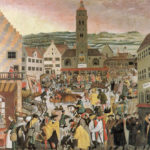Paul Johnson tells us that when General de Gaulle at last decided to retire to his small chateau at Colombey-les-deux-Églises, he and his wife threw a small party to celebrate. Several distinguished journalists were invited, among them a few English reporters. During the conversation, an English lady reporter asked the General’s lady what she most looked forward to now that the general and ex-president of France had retired. “A penis,” said Madame. Silence fell around the table. The general leaned forward tutting. “Your pronunciation, cherie,” he said, not without benevolence; “I sink you mean ‘appiness, no?”
When Margaret Thatcher was in the opposition and Jim Callaghan was Prime Minister in Britain, the House of Commons was usually full, as their repartee was well known. One day in Parliament Callaghan the Socialist gave an enormously long speech, helped by hundreds of sheets of notes, all to do with the economy. Thatcher sat throughout this speech studying some notes of her own, owlish reading glasses balanced on her nose. She never looked up. Callaghan spoke for one hour and nineteen minutes. At last he was finishing. He said: “and what does my Right Honourable friend say about that?” Thatcher rose, removing her glasses. “Eh, what were you saying, prime minister?” she asked. The House collapsed. The Prime Minister deflated like a balloon.
Allan Bennett tells us that Gore Vidal was invited one Christmas on British TV to a meeting with the author of a famous book about rabbits. Oddly enough, Vidal accepted. During the televised meeting the author of the rabbit book was asked what he thought of Gore Vidal’s latest book, Burr. “Meretricious,” pronounced the English author. There was a slight pause, then Vidal said, “Ah yes, meretricious and a Happy New Year to you too!”
Gore Vidal tells us that he was once invited by the eccentric and rather fearsome British poetess Edith Sitwell to one of her ‘red lunches’ at her London club. The food on these occasions was red – lobster, beetroot, tomato salad etc. As the friends gathered, Edith Sitwell summoned the waitress with a steely glance, and said, “Now I know that you Americans always want a drink of something before lunch – something light for me of course. Now, what was that lovely drink that Osbert I became so fond of in New York? Something amusing and – I think – Italian?”” The waitress nodded and went away. Presently she came back with a small goldfish bowl, filled to the brim with a coldly pale liquid in which swam an olive. “Here’s your martini, Dame Edith,” said the waitress.
Princess Margaret, sister of the Queen, had wanted to marry Peter Townsend, but was persuaded not to because he was divorced. He also had an excellent war record. The Princess married instead Tony Snowdon, who quickly became Lord Snowdon. He was a professional photographer of outstanding merit. His sexuality was known to be variable, but the royal couple produced smart and attractive children double quick. Princess Margaret always galloped furiously in the wake of popular culture, and was fond of the theatre. In the Sixties, she went to the Aldwych Theatre accompanied by Snowdon, to see a play about two homosexual barbers, called Staircase. This was a sell-out show partly because the stars on stage were Paul Scofield and Patrick Magee, very distinguished indeed. When the inevitable film was made it starred Richard Burton and Rex Harrison.
In the interval, the Princess went to the theatre’s private bar near the Royal Circle. Snowdon stood chatting to theatrical buddies near the door. Margaret was being entertained by Hal Rogers, the theatre’s manager, who had supplied her with drink. Her Royal Highness looked miffed, so Rogers asked what she thought about the play. “I don’t like it much,” said the Princess, “and if I had known I was going to see about a play about queers I would have stayed (here she paused and stared at the group gathered round her husband) . . . at home.”
Gore Vidal also tells us that his friend the American author Paul Bowles came on a visit to New York, and said that he wanted to meet Edith Sitwell’s brother Osbert. Gore arranged a lunch at the Madison Hotel. This meal was a success, despite Osbert’s Parkinson’s Disease, which had affected his walking, though not his talking. Osbert and Paul were charming. Gore was charming. After lunch they decided to walk back to the St. Regis Hotel, where Osbert was staying. Off they went. On 5th Avenue, Osbert’s shuffling gait began to quicken. Fater and faster he went, taking longer and longer steps. He was a tall, long-legged man so that was very fast indeed. Gore motioned to Paul to take one arm while he took the other to act as anchors. But Osbert was now too far gone to slow down. Gore raced beside him, trying to hold him down, while Paul, who was short and slight, had now left the pavement and was flying through the air, clinging to Osbert’s arm for support. The trio hurtled towards the hotel, where Gore and Paul let go of Osbert, who cannoned into the doorman’s arms. “Too kind!” mumbled Osbert, falling into the lobby.
















Leave A Comment